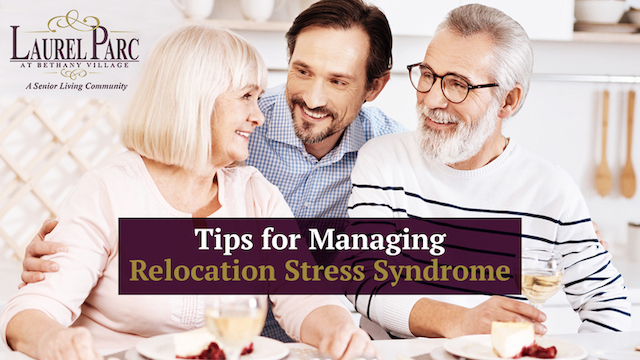Remember the last time you moved? I do. Boxes everywhere, a sense of loss (even in the best circumstances, we are creatures of habit and that loss of familiarity has an impact), and heightened anxiety. Your elderly parents are not exempt from this– in fact, they can even experience greater stress from moves than you or I. Moving elders improperly may even be traumatic to your loved ones and has the potential to lead to relocation stress syndrome.
Relocating a loved one is not only traumatic during sudden moves, so letting your parents know that the move is coming is not necessarily a solution to the problem. There are some fairly simple steps you can take to reduce the chances of relocation stress syndrome while moving elderly parents.
Recognizing Signs of Relocation Stress Syndrome
Relocation stress syndrome (RSS) is what amounts to a psychological failure to adjust to changes that are associated with moving. The days before or after a move can cause a person experiencing relocation stress may be irritable or combative. People struggling with this condition may experience sleeplessness, poor appetite, weight fluctuations, drug-seeking behavior, anxiety, loneliness and confusion.
You may notice that your parents (if they’re experiencing relocation stress syndrome) may begin to withdraw or isolate themselves, refuse medications, or are incapable of focusing. Many of these symptoms mirror dementia symptoms- creating a dangerous situation of a potential misdiagnosis.
Prevent Relocation Stress Syndrome
You can reduce the potential for RSS by utilizing these tips while you’re moving your elderly parents:
- Involve parents in the decision-making process. If an assisted living community is necessary, work together to come to an agreement about the community you choose. This can help your parents maintain a sense of autonomy and dignity.
- Work to assist your parents in feeling warmly welcomed into their new home. You can create a sense of familiarity by mirroring their previous environment with photos, using the previous furniture layout, or small touches to help things feel more like home.
- Encourage them to forget new relationships in their new space. Becoming involved in the community’s activities can be an excellent way of meeting new people. Nothing helps someone feel more at home than having a sense of purpose. At Laurel Parc, our residents reach out to new people joining our community and we strongly encourage this as it limits the amount of distress that new residents experience.
- Acknowledge their fears and feelings and validate them as legitimate. If you downplay their fears or concerns, your loved ones could feel marginalized, unheard, or powerless. This contributes to the stress they’re experiencing and makes the transition more difficult for all involved.
If You Suspect Your Loved One Is Experiencing RSS
Despite our best efforts and intentions, parents may still struggle with the transition. Relocation Stress Syndrome typically shows up in those affected right before a move and within the first three months of moving and can manifest as anxiety, depression, and forgetfulness.
This becomes complicated because despite the effects of stress on the mind and body being well known, they also closely mirror the symptoms of age-related problems. When anyone has stress, they can get angry or irritable, have trouble focusing or thinking clearly and struggle making decisions. These are also all symptoms of dementia.
It’s important to avoid a misdiagnosis of dementia when a loved one is experiencing trauma from a move. When moving an elderly loved one, signs to look for include changes in cognition, eating habits, and sleeping patterns. You may see a new sense of insecurity and a lack of trust combined with a decline in self care efforts.
What Not to Do
People experiencing transfer trauma (RSS) will begin to see their symptoms subside within 3-6 months. This is the typical timeframe it takes an elder to adjust to their new surroundings. What you don’t want to do during this time is compound their trauma by moving them again.
If your loved one is still struggling to settle in- they’re constantly sick, very depressed, or some other significant change in their ability to care for themselves, it’s time to seek out the help of your parent’s doctor and caregiving team.
No matter how you approach it, moving can be (and is) a stressful experience. By taking a few simple steps you can greatly minimize relocation stress for your parents and work towards a successful transition with minimal trauma to your loved one.





